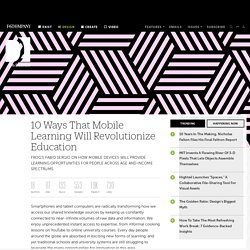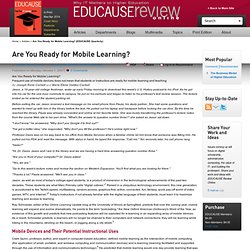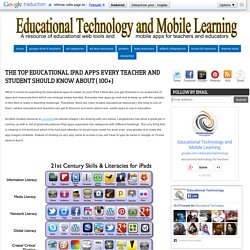

Educational Technology and Mobile Learning. 5 Apps You Want Your High Schoolers Playing With At School ~ Tech News 24h. With today's technology and the development of virtual applications, getting ahead in education has become much easier than in past generations.

If you are a parent of a high schooler, ensuring they are getting the most from their smart phones or tablets will help them to excel even more in school while increasing their interest in learning. There are loads of applications available today that are terrific for high school students considering the different classes and coursework that are often standard requirement for graduation as well as advanced classes for college preparation. Graphing Calculator Purchasing a graphing calculator can sometimes cost more than $100 depending on the brand you are searching for and the features you are seeking in the calculator.
When you don't want to invest in a graphing calculator for your high school student, downloading a free or relatively inexpensive application such as the official graphing calculator is highly recommended. The Chemical Touch. Jumpstart Mobile Learning. My 35 Favorite Free Apps for Teaching. Schools around the country are undergoing a digital transformation.

With iPads and tablets showing up in classrooms with greater frequency, trying to figure out which apps to use can leave a teacher’s head spinning. Last year, when my school debuted an iPad lab, I was thrilled, but as it turned out, I barely used it. I shied away from this new technology (which is definitely not like me!) Because I honestly had no idea how to make the most of the iPads in my daily lessons. Oh, what a difference a year makes! Over the past year, I have found several great educational apps that I integrate into my teaching on a regular basis.
Please note that since the publication of this blog post, two of the apps, Shake-a-Phrase and Stack the States, are no longer free, but are low cost and still useful tools. 10 Ways That Mobile Learning Will Revolutionize Education. Smartphones and tablet computers are radically transforming how we access our shared knowledge sources by keeping us constantly connected to near-infinite volumes of raw data and information.

We enjoy unprecedented instant access to expertise, from informal cooking lessons on YouTube to online university courses. Every day people around the globe are absorbed in exciting new forms of learning, and yet traditional schools and university systems are still struggling to leverage the many opportunities for innovation in this area. Recently frog has been researching how learning models are evolving—and how they can be improved—via the influence of mobile technologies. We’ve found that the education industry needs new models and fresh frameworks to avoid losing touch with the radically evolving needs of its many current and potential new constituencies.
We have been focusing on the concept of mLearning—where "m" usually stands for "mobile" but also just as easily for "me. " 1. 2. 3. 4. Mobile Learning versus E-Learning – Is There a Difference? As the potential for technology to enhance learning grows, we often see the phrase mobile learning bandied about.

Clearly, the term appears vague as the concept emerges, yet it does call to mind a simple question: How does mobile learning differ from online or distance learning options? In order to understand the term let’s review the concept as it exists by using the definition supplied from a rather technical article, “Defining, Discussing, and Evaluating Mobile Learning” on the website irrodl.org.
Strictly from a technological standpoint, the term is used for learning that can be delivered and supported entirely by mobile technology. Therefore, among the most common options that could be used for mobile learning would be PDA’s, smartphones and of course, a wireless laptop. But that begs the question, how does mobile learning differ from other forms of education?
To discuss those options we can immediately begin with the intent of the user. Students. Mobile Learning Resources - Differences between Mobile Learning and eLearning. Marco Tempest: The magic of truth and lies (and iPods) What Is Mobile Learning? Are You Ready for Mobile Learning? (EDUCAUSE Quarterly. Are You Ready for Mobile Learning?

Frequent use of mobile devices does not mean that students or instructors are ready for mobile learning and teaching By Joseph Rene Corbeil and Maria Elena Valdes-Corbeil Jason, a 19-year-old college freshman, woke up early Friday morning to download this week's U.S. History podcast to his iPod. As he got into his car for the one-hour commute to campus, he put on his earbuds and began to listen to his professor's test review session. Before exiting the car, Jason received a text message on his smart phone from Paula, his study partner. "I don't know," he answered; "Why don't you Google it to find out? " "I've got a better idea," she responded. Professor Davis was on his way back to his office from Media Services when a familiar chime let him know that someone was IMing him. "Hello?
" "Hi, Dr. "Are you in front of your computer? " "Yes, we are. " Marco Tempest: Augmented reality, techno-magic. One Year or Less: Mobiles « 2011 Horizon Report. Time-to-Adoption Horizon: One Year or Less According to a recent report from mobile manufacturer Ericsson, studies show that by 2015, 80% of people accessing the Internet will be doing so from mobile devices.

Perhaps more important for education, Internetcapable mobile devices will outnumber computers within the next year. In Japan, over 75% of Internet users already use a mobile as their first choice for access. This shift in the means of connecting to the Internet is being enabled by the convergence of three trends: the growing number of Internet-capable mobile devices, increasingly flexible web content, and continued development of the networks that support connectivity. Mobiles continue to merit close attention as an emerging technology for teaching and learning. The devices available today are multi-functional and robust, but the story of mobiles is no longer solely about the devices we carry. The unprecedented evolution of these devices continues to generate great interest. The Top Educational iPad Apps Every Teacher and Student should Know about ( 100+) When it comes to searching for educational apps to install on your iPad it feels like you get drowned in an avalanche of apps and resources from which you emerge empty-handed.

Everyday new apps go viral and to keep up with the updates in this field is really a daunting challenge. Thankfully, there are many trusted educational resources ( this blog is one of them ) where educators and teachers can get to discover and learn about new useful apps to use in education. Another trusted resource is Langwitches whose images I am sharing with you below. Langwitches has done a great job in coming up with a list of great educational iPad apps organized into categories with different headings.
The only thing that is missing in his work and which if he had paid attention to would have made his work even way greater is to make the app images clickable. 73% of Teachers Use Cellphones for Classroom Activities. More middle- and secondary-school teachers are using digital tools in their classrooms and professional lives, a new report says.

A study by Pew Research Center's Internet and American Life Project released Thursday delves into teachers' increasing technology use, but also expresses educators' concerns about the digital divide. The study surveyed Advance Placement and National Writing Project teachers across the United States, and 92% say the Internet has a "major impact" on their ability to access content, resources and materials for teaching. Teachers are becoming advanced tech users, according to Kristen Purcell, Pew's associate director for research.
"The findings bode well for people who really want to see these tools become a part of the educational sphere," Purcell tells Mashable. Use of mobile technology dominates the learning process, the study finds. Not only are educators using devices in the classroom, but they outpace typical online adults when it comes to personal tech use. Supporting printed books with multimedia: A new way to use mobile technology for learning - Özdemir - 2010 - British Journal of Educational Technology. Leveraging mobile technology for sustainable seamless learning: a research agenda - Looi - 2009 - British Journal of Educational Technology.